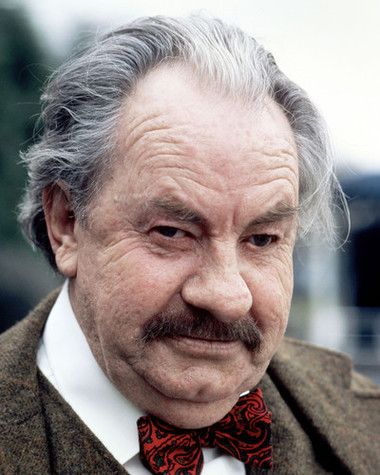Leo McKern (Reginald McKern)

McKern was born in Sydney, New South Wales, the son of Vera (née Martin) and Norman Walton McKern. He attended Sydney Technical High School. After an accident at the age of 15, he lost his left eye. He first worked as an engineering apprentice, then as an artist, followed by service in the Australian Army during World War II. In 1944, in Sydney, he performed in his first stage role. Having fallen in love with actress Jane Holland, McKern moved to the United Kingdom to be with her; they married in 1946. He soon became a regular performer at London’s Old Vic theatre and the Shakespeare Memorial Theatre (now the Royal Shakespeare Theatre) in Stratford-upon-Avon, despite the difficulties posed by his glass eye and Australian accent. McKern’s most notable Shakespearean role was as Iago in Othello, in 1952. He originated the role of Common Man in Robert Bolt’s A Man for All Seasons in the West End in 1960, but for the show’s Broadway production appeared as Thomas Cromwell, 1st Earl of Essex, a role he would reprise for the 1966 film version. He also portrayed Subtle in Ben Jonson’s The Alchemist in 1962. In 1965, he played the eponymous villain in Bolt’s The Thwarting of Baron Bolligrew, and Disson in Harold Pinter’s Tea Party. McKern’s film debut was in Murder in the Cathedral (1952). His other notable film appearances included the science-fiction classic The Day the Earth Caught Fire (1961), the World War I drama King and Country (1964), Help! (1965), the Academy Award-winning adaptation of A Man for All Seasons (1966), The Shoes of the Fisherman (1968), Ryan’s Daughter (1970), Massacre in Rome (1973), The Adventure of Sherlock Holmes’ Smarter Brother (1975), The Omen (1976), The Blue Lagoon (1980), The French Lieutenant’s Woman (1981) and Ladyhawke (1985). He was presented with the Australian Film Institute Award for Best Actor in a Leading Role for Travelling North (1987). In Monsignor Quixote (1985), he co-starred as Sancho Zancas opposite Alec Guinness as Father Quixote.
One of McKern’s earliest television roles was in the 1950s black-and-white series The Adventures of Robin Hood (as Sir Roger DeLisle, usurper of the Locksley manor and lands, and Herbert of Doncaster, a corrupt moneylender). During the 1960s, he was one of several Number Twos in the groundbreaking and critically acclaimed TV series The Prisoner. Along with Colin Gordon, McKern was one of only two actors to play Number Two more than once. He first played the character in the episodes “The Chimes of Big Ben” and “Once Upon a Time”, and later reprised the role in the final episode, “Fall Out”. The filming of “Once Upon a Time” proved to be a particularly intense experience for McKern; according to one biographer, the stress caused him to suffer either a nervous breakdown or a heart attack (accounts differ), forcing production to stop for a time. In 1976 McKern narrated and presented The Battle of the Somme a BBC documentary marking the 60th anniversary of the World War I battle. In 1987, investment firm Smith Barney selected McKern to succeed John Houseman as its spokesman. At the same time, Smith Barney’s corporate advertising department decided to change the format of its television advertisements, the first of which featuring McKern airing in September 1987. McKern’s advertisements were not as popular with the viewing public as Houseman’s, and in 1989, Smith Barney switched to a campaign featuring the voice of American actor George C. Scott. In the 1990s, McKern appeared in a series of advertisements for Lloyds Bank, widely shown on British television, in which he portrayed a character reminiscent of Rumpole.
In 1983, McKern was appointed an Officer of the Order of Australia for his services to the performing arts. McKern informed his daughter Abigail that he suffered from stage fright, which became harder to control with age. He also worried that his stout frame would not appeal to audiences. In 1997 he appeared in a party political broadcast for the UK Independence Party.[9] Suffering from diabetes and other health problems, he moved to a nursing home near Bath in Somerset in 2002. He died a few weeks later at the age of 82. His body was cremated at Haycombe Cemetery in Bath. McKern was survived by his wife Jane, his daughters Abigail and Harriet, and a grandchild.
Born
- March, 16, 1920
- Australia
- Sydney, New South Wales
Died
- July, 23, 2002
- United Kingdom
- Bath, Somerset, England
Cause of Death
- diabetes
Cemetery
- Haycombe Cemetery and Crematorium
- Bath, Somerset, England
- United Kingdom

